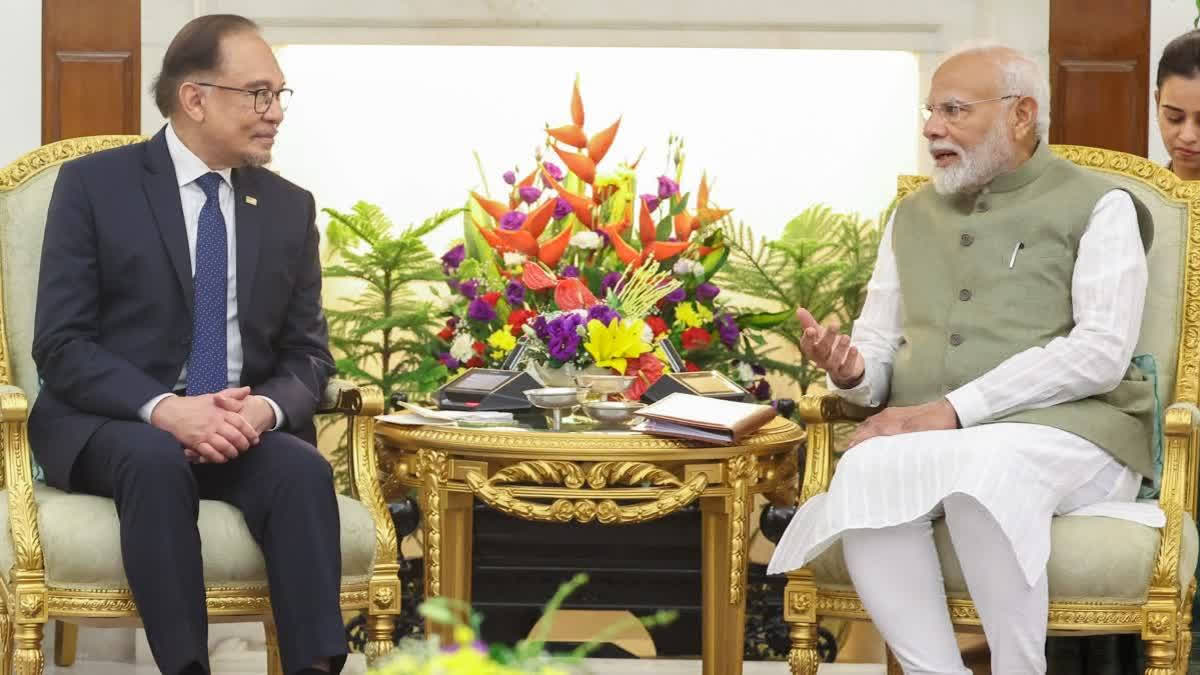New Delhi: Among the eight agreements signed between India and Malaysia following the bilateral summit between Prime Minister Narendra Modi and his Malaysian counterpart Anwar Ibrahim on Tuesday is one on cooperation in the field of digital technologies. “In the area of digital cooperation, both Prime Ministers welcomed the signing of the MoU (memorandum of understanding) on digital technologies and encouraged the early convening of Malaysia-India Digital Council to guide engagement in the digital realm and accelerate collaboration in this area such as Digital Public Infrastructure, digital B2B partnership, digital capacity building, cyber security, emerging technologies such as 5G, quantum computing, cloud computing, Internet of Things among others, between the two countries,” a joint statement issued following the summit reads.
While jointly addressing the media with Ibrahim after the exchange of agreements, Modi said that it has been decided to establish an India-Malaysia Digital Council and to create a startup alliance for cooperation in digital technology. “Work will also be done on connecting India’s UPI and Malaysia’s Paynet,” he said.
Malaysia is the latest country with which India has signed such an agreement. India has made a lot of advances in the last five years in terms of digital economy and cybersecurity, particularly in using mobile phones, UIDAI and Jan Dhan accounts that helped people get access to government financial services like banking.
During its G20 presidency last year, India laid a lot of emphasis on creating a Global Digital Public Infrastructure Repository (GDPIR). Digital Public Infrastructure (DPI) encompasses foundational elements or frameworks like digital identification, payment infrastructure and data exchange solutions. These components play a crucial role in facilitating countries to provide vital services to their citizens, fostering empowerment, and enhancing lives through the promotion of digital inclusion.
Till now, the DPIs of the European Union (EU) and 15 other countries, including India, have been incorporated in the GDPIR. India’s push to promote digital technology cooperation with other countries stems from several strategic, economic, and geopolitical considerations.
Collaborating with technologically advanced nations enables India to access cutting-edge innovations, thereby boosting its technological capabilities. Promoting digital cooperation makes India an attractive destination for global technology companies and investors, driving job creation and economic development. International partnerships provide Indian startups and small and medium-sized enterprises (SMEs) with access to global markets, technologies, and best practices.
The signing of the agreement on cooperation in the field of digital technologies comes on the day the India-Malaysia bilateral relationship was elevated from that of an Enhanced Strategic Partnership to that of a Comprehensive Strategic Partnership. Digital technologies are becoming central to modern geopolitical dynamics. By engaging in digital cooperation with other countries, India is strengthening its strategic relationships and aligning with countries that share similar values on issues like data privacy, cyber security and digital governance. Promoting cooperation in the field of digital technologies helps India to influence global digital governance frameworks in a manner that respects national sovereignty and addresses concerns about data localisation and digital privacy.
India has also promoted itself as the voice of the Global South. Having made significant strides in digital inclusion, particularly through initiatives like Aadhaar, UPI, and Digital India, India can share its experience in building large-scale, inclusive digital infrastructure with other developing countries. This will also help such countries in meeting the UN’s Sustainable Development Goals (SDGs).
Digital technologies have also emerged as a powerful tool in international diplomacy. By sharing its successful digital initiatives with other countries, India can enhance its soft power and influence in international affairs. To sum it up, promoting cooperation in the field of digital technologies with other countries, like in the case of Malaysia, helps India to position itself as a key player in the global digital landscape.
Read more: India-Malaysia Ties Taken Upward Swing Since Anwar Ibrahim Assumed Office: MEA



